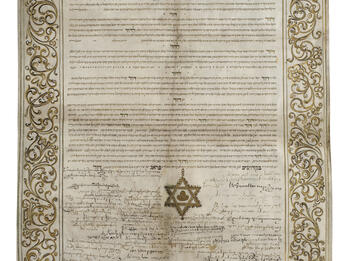Shevut Yehudah (The Captivity of Judah)
I stayed a long time in Hanau because of the heavy burden laid upon me from teaching youth. Although this is a labor performed for the sake of Heaven, it is nonetheless the case that whoever pleases God will escape earning his living by such means, particularly someone who must take care of a wife and children. Knowing that this way of earning a living was hateful to me [see Genesis 29:31], God gave me grace and favor before the holy community of Bingen—may their Rock and Redeemer protect them—and they accepted me as the head of their rabbinic court, in the month of Nisan 5404 [1644]. Here is the text of the letter of rabbinic appointment they sent me:
Prince, lord, great leader of Israel, head of the exile of Ariel, who has executed the righteousness of the Lord and His ordinances with Israel [Deuteronomy 33:21], the honorable master, the mighty cedar of Lebanon, the acute and sagacious, who reveals the depths of the divine mysteries, whose heart is like that of a lion, who is like ben Azzai in the marketplace of Tiberias [see, e.g., b. Eruvin 29a], the brilliant, most eminent chief, our teacher, R. Judah, may his Rock and Redeemer protect him, and may all those standing at the threshold of the splendor of his teaching merit to bask in the pleasantness of his glory. May his God be with him and shield him!
Now, after our salutation, we have come here to inform his excellency that we have been walking mournfully [see Malachi 3:14], without a faithful shepherd, captain, officer, or ruler over us, or anyone who could direct us along the path to the Tree of Life, and “we need the assistance of the Modaite.”1 And as we have seen that the Most High has bequeathed the Torah and testimony to his excellency in Torah and that the hems of his garments were replete with all majesty, splendor, and glory, and that he was expert in the chambers of the Torah—accordingly, when the heads of the people gathered (Deuteronomy 33:5), they voted as a group and chose the good, splendid, majestic grandeur of his greatness to be for us as eyes [see Numbers 10:31], and as a teacher of righteousness, to supply living water and food. May his doctrine drop as the rain, may his speech distill as the dew! [see Deuteronomy 32:2]. May he, moreover, wrap himself in blessings, this teacher of righteousness [see Psalms 84:7], to teach us the path that we should follow and the deeds a man should perform [see Exodus 18:20] to merit eternal life [see Leviticus 18:5]. May he arbitrate between a man and his brother and the stranger with him (Deuteronomy 1:16). Let him also let us hear his pleasant, honeycombed discourses on Shabbat and holidays, for the Almighty has favored him with knowledge, understanding, and discernment.
Accordingly, should he desire to rule over us and place his glorious abode in our midst, he should him come instantly with this delegate, together with his entire household, before Passover; let the wheels of his carriage not tarry in coming here forthwith [see Judges 5:28]. Even if he cannot come with his entire household, his excellency in Torah should at least come himself before Passover, as soon as possible. The rabbinic salary from the community—may their Rock protect and sustain them—shall be fifty gold coins, besides the other income to which the head of a rabbinic court is entitled. Regarding this and the other arrangements between the head of the rabbinic court and the community, he should record them clearly in a letter, which will be kept by us. May he thereby obtain peace from the Master of peace; may this good one come and receive goodness from the One who dispenses goodness and is good [see b. Menaḥot 53b]. These are the words of the insignificant and youthful Uri, son of my master, my father, the communal dignitary R. Moses Raphael Mengiburg, may he be remembered for eternal life, who transcribed and signed the document by order of the communal overseers, on Tuesday, 6 Nisan 5404.
[ . . . ] Now while this was unfolding, the Almighty bestirred the spirit of the holy community of Koblenz, and they sent me a message that I should come to them on the day of their communal assembly, there in Koblenz, to arbitrate between one party and another, for there was a raging divide among them on numerous matters—in particular, regarding the appraisal of their taxes. I therefore came there at their wishes and request, and labored hard, until I mustered the strength, with divine assistance, to calm the discord among them. As a result, I found favor with them, and they unanimously accepted me as head of the rabbinic court of Trier and its environs, as well as Koblenz and its environs, for an annual salary of one hundred ducats. They immediately offered me the rabbinate and its income, over the entire region for about half a year, so that during that period I should have the choice of accepting or declining the position. For I did not wish to accept at that stage the commitment to travel to and reside in their area, due to the great confusion then prevailing there by reason of war, which was worse than in other places. They therefore gave me time to say yes or no, depending upon whether the state of war in their region appeared to be improving. Here is a copy of the original letter of rabbinic appointment they gave me in respect to the aforementioned period:
The children of Israel, the heads of the Lord’s people, the holy community in Koblenz, who are invested with the authority of the lower region of the province of Trier, gathered together, and transcribed and signed that which appears below; and likewise the head of the community, R. Elijah Halevi of the holy community of Trier, invested with the authority of the community of Trier, came to organize and reform the province, to unite the disparate houses of Israel into a single tent, so that there might be no separation—Heaven forfend—between the complementary parts, i.e., the upper region, Trier and its environs, and the lower region, Koblenz and its environs, and in order that none among us should step out of line, away from the upright path, to stray from the law of our holy Torah.
And now, after solid reflection and detailed analysis, we have seen, with the vision of the intellect and through careful investigation, that all the corruption and perversion perpetrated in this province was due to the fact that we have long been like sheep straying by the wayside, like a flock without a shepherd (Numbers 27:17). As a consequence, it can almost be said that everyone does what is right in his own eyes [see e.g., Judges 21:25], thinking: “Who is master over us?” [see Psalms 12:5].
But no one took these matters to heart, until valiant men, the undersigned, arose swiftly from a deep slumber, and girded their loins like warriors, and undertook to persuade the ruling authority—may he be exalted—to permit them to select a man to lead the flock (the House of Israel in the province of Trier) into succulent pastures and to guide them toward springs of living waters. He would provide the guidance of a single leader for the generation, by whose word they would exit and enter [see Numbers 27:21], and by whose word they would travel and encamp [see Numbers 9:24]. He would sincerely and authentically instruct them on the path they should follow and the things they should do—while also repairing our breaches and strengthening every fissure and crack.
We have thus chosen a man who is upright in the sight of God and man [see Proverbs 3:4]—the great, winged eagle, who will reveal matters, and with the wings of his pinions he will provide protective cover for the knowledge of wisdom and understanding, namely the lamp of Israel, the glory of the generation, the head of the rabbinic court of the holy community of Bingen, the great tamarisk, our teacher, R. Judah, son of the communal dignitary R. Samuel, may his memory be for the life of the world to come. May he bring the people to their place in peace [see Exodus 18:23], beneath their vines and their fig trees [see 1 Kings 5:5], by teaching and arbitrating between a man and his neighbor. He shall light up the way for them and remove the stumbling block from among our people.
Notes
[R. Eleazar the Modaite; see e.g., b. Shabbat 55b. This is a general saying expressing the need for rabbinic assistance.—Trans.]
Credits
Published in: The Posen Library of Jewish Culture and Civilization, vol. 5.





